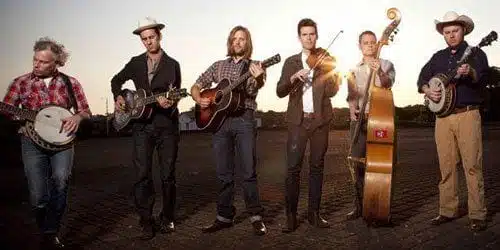
I imagine there are a lot of folks these days who claim to have witnessed the boys of Old Crow Medicine Show busking on the picturesque sidewalks of Boone, North Carolina, a little over a decade ago. Their ferocious bluegrass pickings and high-lonesome, and praising harmonies undoubtedly turned many heads and ears in the college town, but honestly, in a region so steeped in the rustic bluegrass traditions, there were surely just as many people who paid little mind to the sounds serenading their leisurely strolls down King Street.
They say it just takes one to notice though, and one person who did fortuitously notice, was the recently departed Doc Watson, who happened upon Old Crow Medicine’s street performance one day and was so impressed that he signed them up to participate in his annual Merlefest shindig, held in nearby Wilkesboro. From there, the band’s profile soared, leading the six unassuming band members down the road to stardom, as they moved from the smoky bar and alley-way scene to headlining gigs at some of the biggest stages in the business. The band has been able to straddle the two-pronged approach of success, as they’ve sold a lot of records while maintaining a strong critical standing. Furthermore, pushed by the ubiquity of their 2004 single, “Wagon Wheel”, Old Crow Medicine Show even have an identifiable hit song that has been versatile enough to gain airplay at events ranging from weddings and family picnics to dive bars and frat parties alike.
Here in 2012, Old Crow Medicine Show’s success has afforded them to opportunity to stretch out and explore some slight variations of their trademark style and musical presentation. Further solidifying their bona-fide standing is their addition to the ATO Records fold, Dave Matthews’ record label and safe haven to artists with Southern-leaning muscular chops, like Drive-By Truckers, My Morning Jacket, and critics’ darlings Alabama Shakes. Judging from their past efforts of instrumental power and their Appalachian heritage, it’s safe to say that Old Crow truly belongs on this label. However, what makes their latest album, Carry Me Back, a slight step forward is the focus on songwriting. In advance press for the album, band member Ketch Secor admits to a newfound concentration on songcraft, calling attention to how the songs “line up, intertwine, switch partners, and promenade home”. Working with a more rock-leaning producer in Ted Hutt also seems to have etched a spark in the band’s collective conscience as Old Crow seems to take a bit of a rock and roll ethos to the proceedings.
The opening twin tunes, “Carry Me Back to Virginia” and “We Don’t Grow Tobacco”, both fulfill Secor’s declarations to writing as they immediately place the listener directly in the middle of long, bygone eras where the land you worked and owned was of paramount importance. Right off the bat, the energy of the music is also felt as guitars, banjo, fiddle, dobro, and upright bass pulses through with reckless abandon. It’s the sound Old Crow fans adore, but something just seems more emphatic on this album and the album’s opening tunes are guideposts for the remainder of the album. It’s here that listeners are treated to elegiac harmonizing on “Ain’t It Enough”, rueful melancholy on “Ways of Man”, and more provincial storytelling on “Half Mile Down” and “Bootlegger’s Boy”. The songs never stray far from the band’s wheelhouse, yet they feel energized and impactful, as if they are a band once again out to prove to the world that they belong.
The work of Hutt as a producer, the vibrant roots music landscape now experiencing a resurgence, and a change in the band’ lineup may all account for the Old Crow Medicine Show we hear on Carry Me Back. One thing is for certain though: they have arrived and are in no danger of falling by the wayside. At the speed they are moving, legions of fans will continue to say that they knew the boys way back when.

